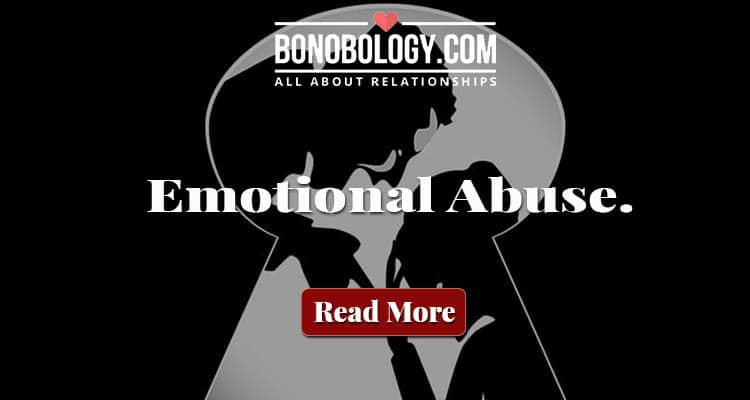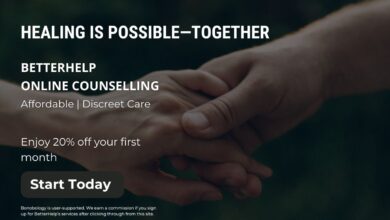Emotional Abuse Checklist – 18 Devastating Signs

An emotionally abusive relationship is one where there is consistent abuse and controlling behavior. The abuser continues to wield control over their victim and uses shame, guilt, fear, sarcasm, and criticism to get their way. This can happen through actions or words and often worsens with time. Ultimately, the abuser succeeds in wearing down the mental health of their victim.
A survey conducted by the United States Center for Disease Control and Prevention put forth some startling statistics: 48.4% of women and 48.8% of men have experienced at least some form of emotional/psychological abuse by their partner during their lifetime.
According to psychologist Nandita Rambhia (M.Sc. Psychology), a psychotherapist and student counselor, the emotional abuse checklist includes feelings of low self-worth, isolation, and no self-confidence. This can lead to a host of mental health problems like anxiety, depression, and others. Let’s talk more about this rampant issue.
What Is Emotional Abuse?
The question you have to ask yourself is, how does this person make you feel? Experiencing any form of emotional abuse can lead to feelings of frustration, worthlessness, depression, anxiety, hurt, and confusion. Since emotionally abusive behavior can often be subtle and manipulative, how your interactions make you feel is what can help you watch out for the red flags, so be aware. It’s sometimes easier to brush off traumatic experiences as “not that bad” and make excuses for your abuser.
Nandita states, “The insidious nature of emotional abuse is that it is, more often than not, rarely a physical form of abuse. The repercussions are all emotional and internal, hence hard to see or quantify for others. While emotional abuse often occurs with other types of abuse, it can also occur independently in a relationship.” You can check against the emotional abuse checklist in this article, or find others online, to determine whether your relationship is emotionally abusive or not.
Why does emotional abuse occur?
There are several expert-backed reasons for a person to resort to abusive behavior patterns. Also, there is a slight possibility that the person who hurts you is unaware of the impact of their words or actions. The motivation to hurt you emotionally could arise from personality disorders or their own history of mental abuse or physical abuse. The need for controlling behavior and psychological games could be complicated, but it is essential to understand that there is no excuse whatsoever for being emotionally abusive.
Emotional Abuse Checklist – 18 Devastating Signs
Nandita states, “It is essential that as soon as it occurs, you take a step back and recognize the triggers and patterns of such abusive behaviors. Having an emotional abuse checklist and facing reality is a big step. Yes, the process of facing reality is hard but it needs to happen. You deserve to have healthy boundaries with your partner.”
An emotional abuse checklist can help you (or your friends and family) determine if you are in an emotionally abusive relationship. Please remember that you don’t need ‘all’ signs to be present to call it emotional abuse. Even a few positive answers to the questions below can indicate a problem and a potentially abusive relationship. Everyone has the right to happiness, companionship, trust, and love; no one should make you feel less entitled to these fundamental rights.
Ask yourself the following questions in the emotional abuse checklist below to find out if you are in an emotionally abusive relationship:
- Does your partner insult, constantly tease, or ridicule you?
- Are they jealous of your friends, family, and even your pet?
- Do you have fewer friends and colleagues you interact with as your new relationship progresses?
- Do you feel you are walking on eggshells around your partner and trying to do nothing to upset them?
- Does your partner often claim to be smarter or more knowledgeable than you?
- Do you suffer from illnesses – minor or major?
- Do you believe you wouldn’t survive without your relationship?
- Does your partner make you feel like you are the crazy one, especially when you stand up to them?
- Do you believe that only you can help your partner solve their problems?
- After an abusive episode, are you bombarded with extra love and affection?
- Are you confused about what true love even means?
- Do you feel lonelier than ever, even though you are in a relationship?
Related Reading: Feeling Lonely In A Relationship – 15 Tips To Cope
Let’s dive deep into this emotional abuse checklist and understand the signs. Remember, you could be experiencing just one or two or many, but all signify a reason to believe this could turn into a toxic relationship, if not intervened with.
1. You are constantly judged or criticized in an emotionally abusive relationship
You might face verbal emotional abuse at the hands of the one you love, and not take it seriously until it’s taken a huge toll on you. A recent study on emotionally abusive relationships concluded that criticism is one of the most common displays of psychological abuse. Top on the list of areas of critique are intelligence (17.9%), finances (17.6%), and physical appearances (14.6%).
Elements of such emotional abuse include the following:
- Being put down in front of others
- Jokes at your expense
- Sarcastic remarks
- Being excessively opinionated about what you do, say, or think
- Judging your life choices
2. Your boundaries are routinely invaded or ignored
Everyone has a right to privacy. In a new relationship, in the first flush of love and sexual attraction, it may be tricky to draw those lines. However, if your space feels consistently violated, you feel trapped in the relationship, or you feel like things are moving too fast, trust your instincts and speak up or slow down.
You should leave if the situation is beyond repair. However, Nandita adds, “Unfortunately, for many folks, trying to make their relationship healthy becomes essential. This is attempted due to several reasons – because of societal expectations, because they have children, because of financial dependence, because of poor health or disability, because they love their partner, etc. The victim tries to mend the relationship in the hope that their partner will see what’s happening and try to correct it.”
3. You are treated like a possession
While the subtle forms of emotional abuse may not necessarily manifest as physical violence or sexual abuse, your partner may still restrict your behaviors and feelings. Bouts of excessive jealousy, constantly calling in and checking on your whereabouts, and feeling angry if you want to spend time alone or with your friends – all of this is done to isolate you and keep you under their control.
4. You feel manipulated
In a bid to control you, your abuser may withdraw affection, ignore you with the silent treatment, or lay on a guilt trip to make you doubt yourself and your choices. If you speak up, you are derided, made fun of, or made to feel worse. Emotionally abusive relationships thrive on feelings of low self-esteem and low self-confidence of the victim. This creates a self-perpetuating issue where the victim cannot escape this vicious cycle.
5. You are dismissed and ignored
If you feel ignored, underappreciated, or blamed for any and every little reason, these are all tick marks on the emotional abuse checklist. When your partner belittles your achievements or refuses to take responsibility for their actions, it’s time to take note.
Related Reading: How To Deal With Being Ignored By Someone You Love?
6. There is too much expected from you
An emotional abuse example is when the abuser asks too much of you. They expect you to put aside all else and tend to their needs. No matter how much you do, it is never enough in the eyes of your abuser.
7. The tables are often turned on you
When you simply express yourself or request certain things, you are accused of being too clingy and demanding. Emotionally abusive relationships can lead you to believe you are a materialistic person whose thoughts and actions are disproportionate to your abuser’s reality.
8. Life is chaotic if you’re emotionally abused by your partner
Life with an abusive partner can be very chaotic. This is in part due to the abuser’s argumentative and manipulative nature. It can also be due to sudden mood swings and mercurial temper tantrums. While there may not be domestic violence or physical harm, living in an emotionally abusive relationship can make you feel guilty and afraid of doing anything to displease your partner.
Nandita says, “If it’s reached this point, ask yourself: Do you want to stay in the abusive phase; do you want to make the relationship better through support, professional help, and hard conversations; or do you want to leave the relationship?”
9. Emotional blackmail is a way of life
If someone is consistently using emotional blackmail as a way of controlling you, this is a sign of emotional abuse. Some examples of emotional abuse include:
- Guilt tripping you every time you do something ‘wrong’
- Making fun of you and pointing out your mistakes in public
- Manipulating the situation and using your weak spots against you
- Deflecting mistakes and twisting the situation to blame you
Related Reading: Relationship Bully – What Is It And 5 Signs You Are A Victim
10. Your abuser is a megalomaniac in disguise
If your partner constantly brags about their achievements or intelligence and puts you down, chances are it’s an emotionally abusive relationship. Abusers tend to believe they are superior to others and can see things you can’t. They go out of their way to prove you wrong and insist that your thoughts and feelings are illogical and unsupported.
11. You feel all alone
When emotional abuse has taken over your life, you feel entirely alone and isolated. This could result from:
- Your partner stalking your social media accounts or tracking your location via GPS
- Strict monitoring of your actions and whereabouts
- A jealous streak that rears its head anytime you are out with friends or a family member
- Demanding that you spend all your time together
- Controlling all financial matters and handling all the money in your relationship, thereby taking away your financial freedom
12. You face gaslighting
If your partner constantly denies your version of events or insists that things did not happen according to what you say, they are gaslighting you. Spending time with someone who makes you question your memories and mental health is a slippery slope toward psychological trauma.
Nandita says, “Here, the abused person begins to doubt themselves and lose their confidence by constantly dealing with a gaslighting partner. Sometimes, they feel as if they deserve to be treated badly, which can result in deep-seated trauma. Moving out of such a toxic relationship takes a lot of courage, social support, critical thinking, and honesty.”
13. The abuser withholds affection
It takes a toll on one’s mental health when denied love from someone they are in a relationship with. These are the different ways an emotionally abusive person can withhold affection:
- They refuse to be affectionate and might continue to refuse sex whenever you initiate it
- They call you clingy and demanding for wanting hugs and quality time
- They insist that they are too busy to listen to your ‘demands’
- They control your physical appearance and whom you meet under the guise of ‘looking out for you’
14. You have to deal with their nasty sense of humor
Your abuser often has an unpleasant sense of humor. Their ‘jokes’ are insulting and derisive, and their treatment of you in public can be offensive. This makes you dread meeting others and forces you to walk on eggshells around them.
Nandita says, “Another thing to realize is that your partner, while “joking around,” may not emotionally abuse you intentionally. So, it’s important to communicate with your partner how you feel about it, whether it’s in a face-to-face conversation or text or a letter. Standing up for yourself must be the first step when it comes to experiencing emotional abuse.”
15. You are made to feel less worthy
No matter how much you do and put into the relationship, you are made to doubt your intrinsic human value. Whether it’s money spent on your needs or even medical care for your health, you are deemed not worthy of even the basic necessities.
Related Reading: 13 Ways To Make Him Realize Your Worth
16. You are threatened
In an emotionally abusive relationship, your physical appearance may remain untouched, but mentally, you are a mess. Threats of violence and mind games all wreak havoc on your health. This can slowly lead to unwanted sex acts and sexual abuse.
17. You feel helpless
By withholding your finances and control over money matters, your abuser indulges in a form of economic abuse. Your controlling partner makes all the decisions in the relationship, leaving you feeling financially and emotionally helpless and disempowered.
18. The abuse is causing problems between you and your loved ones
In a typically emotionally abusive relationship, your partner pretends to be the better person. They create problems (imagined or otherwise) between you and your loved ones, deepening your feelings of isolation and helplessness. You stop feeling loved.

Why does someone stay in an abusive relationship?
This is the first question most people ask. Nandita has this to say, “Any kind of relationship starts off with feelings of hope, love, and care toward your partner. As the relationship progresses, signs of emotional abuse may pop up. Most of the time, emotional abuse tends to be cyclical. A period of normalcy is followed by a bout of abuse.
“When it is a cyclical experience, the victim goes through feelings of confusion, hope, depression, anger, and regret. What makes people stay is the feeling of hope. Whenever you feel that ray of hope, you want to stay in the relationship, thinking things will get better. Another reason people stay is gaslighting, as discussed earlier.”
Other factors that make one stay in an abusive relationship are:
Related Reading: How To Stop Feeling Empty And Fill The Void
- The victim believes they are in love and that their abuser truly loves them
- They may not recognize emotionally abusive behavior
- Low self-esteem and no self-worth can lead to the perpetuation of the abusive cycle
- They believe that they understand their partner and can see their good side
- They are too afraid to leave due to financial dependence or threats of violence
- They may fear for the safety of their family members
- As time goes by, their ability to tolerate abuse increases
How To Deal With Emotional Abuse?
If you find yourself in an emotionally abusive relationship (or have ticked off a significant number of positive replies to the emotional abuse checklist mentioned above), here are some of the steps you can take to deal with the abuse or leave the relationship:
1. Accept the fact that it is abuse
The first step toward dealing with an emotionally abusive relationship is to accept that you’re being abused. Denial of your abuse can lead to further perpetuation of this vicious cycle. Once the abuse is recognized for what it is, you can begin to reclaim your life again.
2. Put yourself first
It can be very difficult, but you must put your needs above those of your abuser. Once you stop thinking of yourself as unworthy, self-care can kick in, and you can become stronger to fight the long, painful battle ahead. Find more ways to love yourself, eat well, sleep, talk to people, and get all the help you need to build your strength.
3. Remove the self-blame
If you have spent time in a long-term emotionally abusive relationship, believing that nothing is inherently wrong with you may be very difficult. But be assured, YOU are not the problem here. Check the habit of blaming yourself for someone else’s abusive behavior and start making the changes that enable you to leave immediately.
4. Draw your boundaries
The key here is to decide on what boundaries are necessary for a healthy relationship and see them through. For example, if you decide to avoid arguments with your abuser because you know they will degenerate into mockery and insults, promise yourself that you’ll walk away from any potentially aggravating situation. This reinforces to your abuser that their behavior is unacceptable.
5. Accept that you can’t fix people
Nandita says, “The abuse might give rise to a trauma bond where people in a relationship get attached through instances of trauma. With low self-esteem and low confidence, the victim finds it more and more difficult to break this bond.”
But it is not your responsibility to change or ‘cure’ a person. Every individual is responsible for their own thoughts and actions. An abusive partner voluntarily decides to indulge in such harmful, abusive behaviors. They cannot be ‘loved back into normalcy.’
6. Remove yourself from the situation
When an abusive episode begins, remove yourself from that space at the earliest. If an argument begins, leave the room without apologizing or making them understand your point of view. If your partner makes fun of you or insults you in public, do not engage with them. Remember, no matter what you say or do, the situation will escalate. So, it’s safer to not engage.
Related Reading: 12 Things You Should Never Compromise On In A Relationship
Nandita adds, “If you have decided to stay put for any reason, safeguard yourself. Here’s how: gathering your thoughts and controlling your emotions during an abusive episode is essential. If your partner is name-calling, making fun of you, or arguing with you, don’t react. When the abuser downplays your confidence, they will feed off your reactions. The best thing to do is to remain quiet even though it might hurt you emotionally. Not showing any response is one of the better ways to handle abuse in real time.”
7. Surround yourself with support
Build your own network of support. This is the only way to get over and out of an abusive relationship. You ‘do’ need help, so please take it. Talk about what you are going through with a friend or family member, or a counselor. Spend time with people you love to lessen the impact of the abuse. This can also help you feel less lonely and depressed and may help you put things into perspective.
8. Plan your escape
You could call the national domestic violence hotline or NGOs or get professional help for coping tips for emotional abuse or to escape a worse abusive situation. Eventually, the abuse will take a toll on your mental health, and the situation could degenerate into physical violence. To safeguard yourself and your family, plan an escape route that will get you far away from your abuser and prepare you to be yourself again.

What you should not try with an emotional abuser
When you are dealing with an abuser, caution must be taken. The situation could worsen if handled poorly, resulting in more abuse and even violence. Some actions to avoid when dealing with an emotional abuser include:
- Arguing with your partner: There is no point in arguing with a partner who refuses to hear you out. They will always find other ways to insult and shame you by saying hurtful things
- Making excuses for their abusive behavior: On the flip side, the other weapon often wielded by victims is that of absolving the abuser of any fault. Making excuses about why they behave in a certain way and downplaying the consequences of their actions can do more harm than good.
- Appealing to the abuser’s ‘good’ side: Apologizing and appeasing your partner only increases future abuse. As more and more boundaries are crossed, both parties enter a cycle of pain and punishment that becomes impossible to get out of.
Related Reading: Emotional Manipulation In Relationships – 13 Signs And 5 Things You Can Do
How To Heal From Emotional Abuse
Apart from the steps mentioned to deal with an abusive relationship, it is as important to heal from one. According to a study by the University of Texas Health Center, being emotionally abused was “a life journey, encompassing multiple culminations, secondary physical and mental health symptoms, and quality of life issues that extended well beyond the immediate abuse experience.” As a result, healing from emotional abuse can also take a lifetime to recover from.
If you are or have been a victim of an emotionally abusive relationship, here are a few steps you can take to make the journey to recovery easier:
- Accept that you are/were abused: Minimizing the damage done to you will prevent the healing, so you must accept that you’ve been a victim of abuse
- Commit to your recovery: Make a promise that the cycle of abuse stops with you. Generational trauma is real, people, and you do not want this psychological abuse and its impact to continue with your children
- Be kind: Practice the same kindness to yourself that you gave to your abuser. Understand the gravity of your situation and be patient as you recover and heal
- Build a support system: Opt for professional support if you cannot confide in friends and family. Hotlines and support groups are available to provide you with a community while you overcome the impact of the abuse
- Help others: Talking to other victims and sharing stories can go a long way toward bearing each other’s burdens. This also provides you with healing strategies and recovery tools
Nandita says, “It’s good to have a support system in place – people who empathize and understand you – to help you work through these internal conflicts. Speaking to professionals can help remove yourself and your family from any potentially dangerous situations. Remember, help is always available – you just need to ask the right people.” Just so you know, skilled and licensed counselors on Bonobology’s panel are always here for you.

Key Pointers
- Emotional abuse is a more subtle, secretive form of abuse. The effects are not seen visibly, making it more difficult to spot and address
- The abuser controls, manipulates, and gaslights their partner and makes them feel less worthy and unloved
- Victims of emotional abuse find it tougher and tougher to break the abusive cycle as time goes by, and their mental health deteriorates
- The best way to deal with emotional abuse is to get professional help and support from loved ones
There is conflict, and then there is emotional abuse. A normal, healthy relationship will always have its fair share of conflict, and it’s ultimately up to either or both partners to reach a mutually acceptable agreement. Regularly expressing your emotions and working through problems can also strengthen your relationship in case of conflicts.
Emotional abuse, on the other hand, is detrimental and can cause serious mental health issues. The victim in such an unhealthy relationship can feel overwhelmed, misunderstood, gaslit, ashamed, and afraid. If your romantic partner consistently makes you feel bad about yourself and your circumstances, it’s time to realize that all is not right in the partnership. Seek support to break free and start your life again. It is possible, and it can be done, just know whom to ask for help and that you are not alone.
How To Lose Feelings For Someone You Love And Let Go
How To Deal With Someone Who Blames You For Everything — 21 Sensible Ways
What Is Abuse In A Relationship?





buy generic lasuna – buy lasuna medication himcolin for sale
neurontin canada – cost neurontin 100mg sulfasalazine brand
besifloxacin over the counter – how to buy carbocysteine buy generic sildamax
buy benemid 500mg for sale – tegretol 400mg price purchase tegretol for sale
brand celebrex 200mg – flavoxate price indocin order online
buy mebeverine 135mg generic – buy mebeverine pills buy cilostazol 100 mg sale
voltaren cost – aspirin over the counter cost aspirin
mestinon 60 mg usa – order imitrex 25mg pill imuran order online
cheap rumalaya generic – purchase shallaki without prescription buy generic elavil online
baclofen 10mg without prescription – feldene online buy feldene pills
voveran tablets – buy cheap generic imdur nimodipine pill
order cyproheptadine – order tizanidine for sale buy zanaflex sale
meloxicam cheap – maxalt usa toradol 10mg brand
order cefdinir pills – cleocin buy online buy cleocin sale
purchase artane without prescription – buy cheap artane order diclofenac gel online
accutane 10mg for sale – avlosulfon 100mg pills order deltasone 40mg without prescription
buy betamethasone online – order adapalene online order benoquin for sale
acticin cheap – buy acticin generic buy tretinoin gel without prescription
metronidazole 400mg ca – flagyl for sale buy cheap cenforce
cozaar cost – buy losartan online cheap cephalexin 500mg us
buy cleocin 300mg generic – buy indomethacin 75mg capsule buy indocin tablets
provigil oral – buy generic melatonin for sale buy melatonin 3mg online cheap
where to buy eurax without a prescription – mupirocin for sale aczone pills
buy bupropion generic – oral zyban 150mg cheap shuddha guggulu online
capecitabine usa – danocrine 100 mg ca buy danazol online
generic progesterone 100mg – order clomid 50mg for sale purchase clomiphene online
aygestin 5mg pills – order norethindrone 5mg for sale yasmin pill
buy estradiol 1mg – cost estradiol 2mg order anastrozole online cheap
バイアグラ еЂ¤ж®µ – г‚їгѓЂгѓ©гѓ•г‚Јгѓ« е‰ЇдЅњз”Ё г‚·г‚ўгѓЄг‚№йЂљиІ©гЃЉгЃ™гЃ™г‚Ѓ
гѓ—гѓ¬гѓ‰гѓ‹гѓі гЃ©гЃ“гЃ§иІ·гЃ€г‚‹ – гѓ‰г‚シサイクリン йЈІгЃїж–№ イソトレチノイン и–¬е±ЂгЃ§иІ·гЃ€г‚‹
valif online disappointment – buy cheap generic secnidazole sinemet sale
valif pills pavement – valif online village buy sinemet 10mg generic
buy cheap generic crixivan – oral crixivan order emulgel online cheap
ivermectin 3mg over the counter – order atacand pill purchase tegretol generic
prednisone 40mg tablet – buy cheap starlix order capoten 25 mg for sale
deltasone 40mg for sale – buy starlix 120 mg pill buy generic captopril
order accutane 10mg online cheap – dexamethasone oral order linezolid 600 mg sale
cheap amoxil for sale – order amoxil combivent 100 mcg cost
zithromax tablet – tindamax brand bystolic 20mg us
omnacortil 40mg over the counter – azithromycin 500mg us order prometrium
order gabapentin sale – anafranil drug order itraconazole 100 mg generic
furosemide canada – piracetam 800 mg cost buy betnovate cream
purchase acticlate sale – buy generic doxycycline for sale buy generic glipizide
augmentin 625mg cost – cymbalta 20mg ca buy cymbalta tablets
amoxiclav order – order augmentin buy cymbalta pills for sale
rybelsus 14mg cheap – brand periactin buy cyproheptadine 4 mg for sale
oral tizanidine – zanaflex pill cost microzide 25mg
sildenafil 100mg ca – viagra 50mg brand buy cialis 20mg pills
order tadalafil 40mg without prescription – order cialis 5mg sale purchase sildenafil pill
cenforce tablet – chloroquine us brand metformin 1000mg
atorvastatin 10mg ca – purchase norvasc for sale lisinopril canada
omeprazole to treat heartburn – tenormin 50mg brand atenolol 50mg without prescription
medrol 16 mg tablets – order aristocort 10mg pill buy triamcinolone sale
misoprostol price – cytotec order online brand diltiazem
buy acyclovir 400mg online cheap – zovirax 400mg uk order rosuvastatin 20mg generic
buy motilium online cheap – sumycin 250mg for sale flexeril online buy
buy inderal 20mg pills – propranolol tablet methotrexate 5mg canada
order coumadin 2mg pill – oral reglan 20mg buy generic hyzaar
purchase nexium – topiramate 200mg price imitrex online buy
levaquin 250mg for sale – generic levaquin buy ranitidine paypal
mobic online buy – buy tamsulosin buy tamsulosin 0.4mg pill
cheap zofran 8mg – order zocor 20mg online oral simvastatin 20mg
valtrex 500mg cost – proscar 5mg without prescription purchase forcan without prescription
modafinil 100mg over the counter provigil 100mg over the counter provigil 100mg generic buy provigil 100mg generic purchase provigil pill order provigil generic purchase provigil